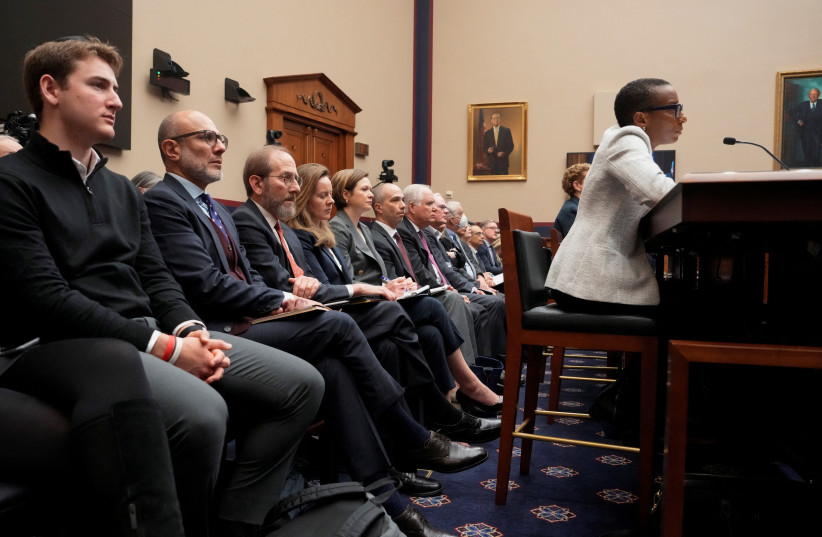More than 70 US lawmakers on Friday demanded the governing boards of three of the country's top universities remove their presidents, citing dissatisfaction with their testimony at a hearing about antisemitism on campuses, according to a letter seen by Reuters.
In the letter, Republican Representative Elise Stefanik and Democratic Representative Jared Moskowitz demanded that the board of governors at Harvard University, the University of Pennsylvania, and the Massachusetts Institute of Technology oust their presidents or risk committing "an act of complicity in their antisemitic posture."
Penn President Liz Magill, Harvard President Claudine Gay, and MIT President Sally Kornbluth, who all testified before a US House of Representatives Committee on Tuesday, have come under fire from their schools' Jewish communities for their handling of clashes between pro-Israel and pro-Palestinian contingents since Hamas' Oct. 7 attack on Israel.
Calls for Magill's and Gay's resignations in particular have mounted in the days since their testimony, during which they declined to give a definitive "yes" or "no" answer to Stefanik's question of whether calling for the genocide of Jews would violate their schools' codes of conduct regarding bullying and harassment.
"Testimony provided by presidents of your institutions showed a complete absence of moral clarity and illuminated the problematic double standards and dehumanization of the Jewish communities that your university presidents enabled," the letter said.
"Given this moment of crisis, we demand that your boards immediately remove each of these presidents from their positions and that you provide an actionable plan to ensure that Jewish and Israeli students, teachers, and faculty are safe on your campuses," the letter said.

It was signed by 71 Republicans and three Democrats.
Representatives from the schools did not immediately respond to requests for comment about the letter.
Ivy League heads: Calls for genocide on Jews are context-dependent
At Tuesday's hearing of the US House Committee on Education and the Workforce, Representative Stefanik of New York grilled Magill, Gay and Kornbluth during an exchange over antisemitic speech.
"If the speech turns into conduct, it can be harassment," Magill replied. "If it is directed and severe and pervasive, it is harassment."
Kornbluth and Gay gave similar answers, each saying it was context-dependent.
Video clips of the hearing went viral, prompting further outrage among the schools' Jewish communities and an increase in calls for leadership changes.
In a video statement posted after the hearing, Magill said she should have focused more on the "evil" of advocating genocide, instead of framing the matter as an issue of free speech in line with the US Constitution and traditions of on-campus debate.
"I want to be clear. A call for genocide of Jewish people is threatening, deeply so," Magill said.
Gay apologized for her remarks at the hearing in an interview with Harvard's student newspaper on Thursday.
"I got caught up in what had become, at that point, an extended, combative exchange about policies and procedures," she told the newspaper.
"What I should have had the presence of mind to do in that moment was return to my guiding truth, which is that calls for violence against our Jewish community — threats to our Jewish students — have no place at Harvard, and will never go unchallenged."
The Executive Committee of the MIT Corporation said in a statement on Thursday that Kornbluth still had their full support.
"She has done excellent work in leading our community, including in addressing antisemitism, Islamophobia, and other forms of hate, which we reject utterly at MIT," the statement said.
Since the October 7 massacre and Israel's massive counterattack on Gaza, incidents of antisemitism, including violence, have surged in the US and elsewhere.
